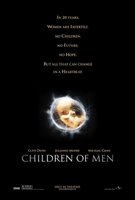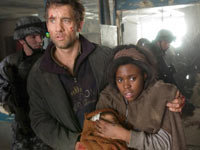Going to see a film in London's Odeon Mezzanine always reminds be of two things:
- flying economy long distance;
- a home cinema set up.
With 68 seats crammed into a wee room, everyone ends up shuffling around until they have a free seat on at least one side, and then mutter when latecomers plunk themselves down in the empty seats. And the screen must have a diagonal of a whole 6–7 metres.

But, what about the film?
Loosely based on PD James’ novel, Children of Men portrays the world in 2027.
Infertility had quickly spread across the world. No babies born anywhere after 2009. In fact, near the start of the film, the murder of the world’s youngest person at the age of 18 (referred to as the “youngest baby”) is announced.
So it’s a world without children. One missing the cries of babies. Lacking hope.
A suicide drug is widely (and legally) available:
“Quietus—you decide when it's time”.
On the surface, London looks much the same, maybe just a little more dingy. Old red buses, bin bags still sit out on streets, mounted guards in ceremonial uniform riding down Pall Mall, people sitting in parks. England has survived better than the rest of the world, much of which has been torn apart by war and nuclear terror.
But England is now a magnet for immigration. So outlying areas, like Bexhill have been turned into massive refugee (Fugee) camps, with the boundaries controlled by the military, and run by gangs inside.
Theo lives in London. His son died in an accident very young. His ex-wife is an activist with The Fishes, working to promote Fugee rights, with connections to “The Human Project”, a group of scientists who have organised a fertility research centre on the Azores.
Pressurised into getting transit papers from his powerful uncle, Theo ends up escorting a Fugee girl called Kee to the coast, hoping to rendezvous with a disguised hospital ship. Their plan is to get to the coast by getting arrested and getting inside Bexhill refugee camp! Miraculously, the girl is pregnant. And The Fishes resistance want Kee to stay in England to use the baby as a political pawn; while she needs to escape.
At times it’s a very dark film. The oppression and violence is consuming. So many people are hanging on to life by their fingernails, and living in hellish conditions. The film’s body count is high. Very high. Watch out for the lovely touch when blood splatters onto the camera lens! Gritty realism. (Though I think Casino Royale may leave even fewer standing. Hard to know.)
But in the middle of all of this there is humour. At one point in the film, Theo loses his shoes, and spends most of the rest of the film adventuring in a pair of flip flops!
The imagery is powerful.

Assisted by Theo, Kee gives birth lying on the floor of a dirty room: very Mary and Joseph, no room at the inn. (Though I’d like to point out that childbirth may not always be as straightforward as portrayed in the film.)
Theo spends the entire film protecting and helping people. He never carries a weapon, never kills one. Except perhaps by deliberately opening the car door and knocking two people of their motorbike!
There is also hope. Military might silenced by the appearance of a baby. Soldiers and rebels crossing themselves, reaching out to touch the garment of the baby or his mother. And the human nature that can be so quickly amazed, and then so swiftly distracted back to warfare.
There are a number of spectacular and impossibly long one-take shots in the film. At the time, I didn’t notice that they were uncut. Rather I noticed that I was drawn closer to the action; it become more intense as you viewed the action in real time.
So look out for the car chase near the beginning, and a scene near the climax where Theo and Kee “move hundreds of feet along a street, into a building and up a flight of stairs, have a scene with dialogue, during which there is continuous gunplay and explosions, and a retreat back down and out of the building” (to quote Wikipedia).
In summary, it's a very thought provoking film, and makes me want to read the book (which is quite different to the screenplay). For many couples in 2006, childlessness is a choice, rather than an absolute condition. For others, it is already a sad forced reality through health or death.
Society loses something when young voices are silenced, or when any section of the community is absent or ignored.
No comments:
Post a Comment